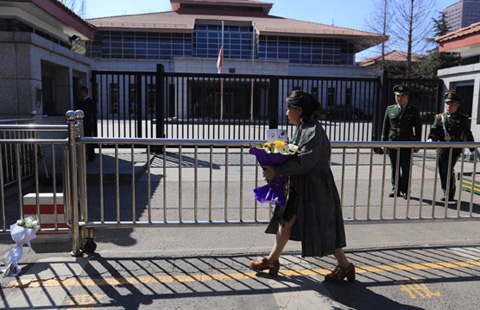China's land-sea silk road initiatives to benefit Russia
Updated: 2015-03-24 16:52
(Xinhua)
|
||||||||
MOSCOW -- Russia welcomes China's initiatives on building the Silk Road Economic Belt and the 21st Century Maritime Silk Road (also known as the One Belt-One Road initiatives), which according to experts, would bring advantages rather than harms to Russia's overall development.
China's annual sessions of the legislative and political advisory bodies have recently adopted economic, social development plans, which listed the development of the "One Belt" and "One Road" as one of "the three key strategies" of the country and pledged an effective implementation.
Aimed at strengthening regional connectivity through the reinforcement of transport infrastructure, investment and trade, financial cooperation and cultural exchanges, the two initiatives are calling for the collective efforts of countries along the routes.
According to Vasiliy Kashin, a senior researcher at Center for Analysis of Strategies and Technologies, the One Belt-One Road initiatives can help Russia reduce its reliance on European markets and cope with the current economic drag amid Western sanctions.
"The Belt and the Road can bring investment into the infrastructure connecting Russia with Asia and give a chance to expand Russia's non-energy commodities export including grain, metals, chemical products and so on," Kashin told Xinhua in an interview recently.
While admitting there are indeed worries about unnecessary competition in Central Asia and the "One Belt-One Road" project's influence on the Russia-led Eurasian Economic Union, Kashin believed that further negotiations and consultations would eventually lead to the establishment of coordination mechanisms between the two countries' regional integration projects.
A similar opinion was raised by Petr Mozias from the National Research University's High School of Economics, who pointed out that Russia's interests could be realized rather than harmed if the government shows active stance both at economic and geopolitical tracks.
"The Chinese initiatives give Russia opportunities provided that it will participate in the concrete implementation of the strategies," Mozias told Xinhua, adding that Russia's participation in the "One Belt" and "One Road" construction is one of the tools to diversify its economy.
Since currently Russia is under Western sanctions "which will not be lifted or significantly eased for many years to come," Kashin suggested that Russia should take the opportunity and attract Chinese investments in infrastructure, energy and manufacturing, as well as coordinate economic projects in the Central Asia.
"As I understand, newer and freer trade regimes between Russia and China are also a topic for future discussion," Kashin added.
Mozias also said that Russia's shipbuilding and the development of sea transportation routes could benefit from China's initiatives, while the Russian access to foreign markets would also be expanded.
As Russia-China relationship has been "at its best period in history," both experts agreed that the "One Belt-One Road" initiatives would help the two countries reach a closer interdependence.
According to Kasin, the two countries currently need to discuss and create the financial infrastructure in order to shield the bilateral trade from external pressure and interference.
"Russia is especially interested in cooperation with China in finance, including the increase of trade in both national currencies and the access to finance from the Chinese banks," Kasin said.
Mozias said that the two countries could cooperate more on logistics and high value-added exports, like aviation and the IT.
Moreover, Kasin expressed his hope that a general agreement or action plan should be the next focus in order to figure out each party's clear role under the framework of the "One Belt" and "One Road".

 Tokyo's plans to build new US base possibly scuppered
Tokyo's plans to build new US base possibly scuppered
 Conversation topics only heard in China
Conversation topics only heard in China
 Snow blankets Chicago after spring storm
Snow blankets Chicago after spring storm
 Dramatic changes for Chinese miners in the last 30 years
Dramatic changes for Chinese miners in the last 30 years
 Top 10 young Chinese entrepreneurs defining the future
Top 10 young Chinese entrepreneurs defining the future
 Singapore Embassy in Beijing mourns Lee Kuan Yew
Singapore Embassy in Beijing mourns Lee Kuan Yew
 China joins legendary flower show
China joins legendary flower show
 Monks perform tea-picking ritual in Hangzhou
Monks perform tea-picking ritual in Hangzhou
Most Viewed
Editor's Picks

|

|

|

|

|

|
Today's Top News
Beijing 'welcomes interested nations joining the AIIB'
House passes resolution urging Obama to send arms to Ukraine
US to strengthen cooperation on clean energy with China: Pritzker
Boston bomb suspect influenced by Al-Qaida
Students humbled by trip to China
Antitrust policy 'treats
all fairly'
Lee remembered as 'old friend' of Chinese people
Huawei plans big push to sell smart devices in US
US Weekly

|

|







